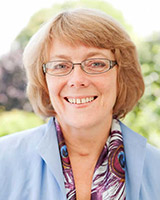A Word From Dean Lorie Wild

The landscape of nursing education is changing. Providing clinical experiences for students, especially BSN pre-licensure students, is a growing challenge. Hospitals and other clinical agencies are finding it difficult to meet the demand for clinical placements due in part to the emergence of new graduate residency programs (a good thing) and the overall acuity of illness in hospitalized patients. Despite a tremendously positive response from our community practice partners for our students and graduates, we, too, confront the reality of clinical placement shortages.
So what is a nursing education program to do? A recent study published by the National Council of the State Boards of Nursing indicates that high-quality simulation can be substituted for up to 50 percent of traditional clinical rotations. The study compared students in traditional clinical experiences (control group) with those where simulation experiences comprised 25 percent or 50 percent of their clinical hours. The good news is that all learners scored high on nursing knowledge assessment and had a comparable pass rate on the NCLEX.
The researchers emphasized a number of important factors contributing to the outcomes:
- Faculty formally trained in simulation teaching and learning.
- An adequate number of faculty to support learners.
- Subject matter experts who conduct sound, theory-based debriefing.
- Equipment and supplies to create a realistic environment.
Currently, our BSN students spend between 15 and 25 percent of their clinical hours in the Nursing Skills Lab. Students’ time in the lab has been enhanced as we’ve been able to upgrade and add much-needed equipment, enabling them to practice urinary catheter insertion, wound management, and IV starts.
Another special addition to the Skills Lab — made possible through a generous gift — is “Noelle,” an OB simulation manikin. Noelle provides a safe opportunity for students to practice — unlike real patients, Noelle can give birth multiple times every day!
Yet, even with these additions, students’ opportunities to participate in “high-fidelity” simulation are limited. With that in mind, a primary focus for our faculty in the upcoming year is to evaluate our current use of simulation, as well as where and how we can enhance our program to ensure high-quality learning that prepares students for direct-care experiences. While we aren’t ready to move to 50 percent simulation, we do want to make sure that we are poised to use simulation in the best way to complement our curriculum.
I would like to invite you to support our work to develop our simulation capacity through a gift to the Nursing Skills Lab. Last year, an anonymous donor challenged us to raise funds that would be matched up to $20,000. Through your generosity, I am pleased to share that we made it! Even better news: The same donor is doing another challenge for 2015. Your gifts will be matched up to $25,000 — what a great way for you to extend the reach of your gift and the benefit to our students’ learning.
To make your gift today, go to spu.edu/give-to-shs, and select “SHS Skills Lab” or “Dean’s Giving Circle” from the drop-down menu.
You can also mail your gift to:
Seattle Pacific University
3307 Third Avenue West, Suite 304
Seattle, WA 98119-1997
By designating “SHS-Skills Lab 115728” or “Dean’s Giving Circle 115711” in the memo line of your check, you can make sure your gift supports tomorrow’s leaders in nursing and health care.
On behalf of all of us in the Lydia Green Nursing Program, please accept my thanks for all you do in support of our students, the school, and SPU. Through your gifts and prayers, you are making a difference.

